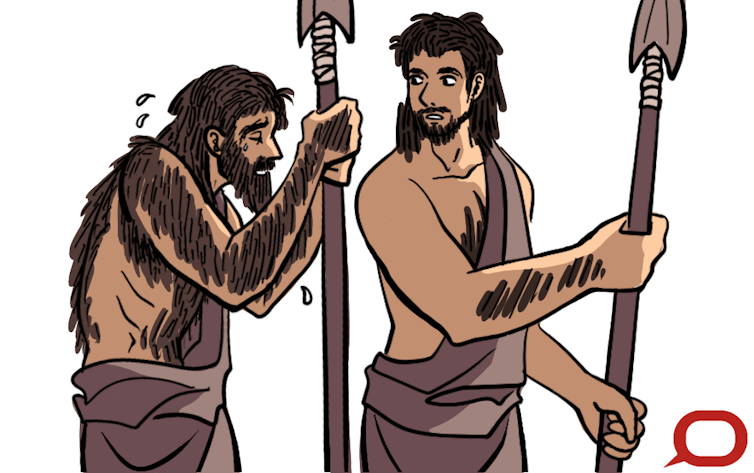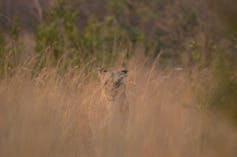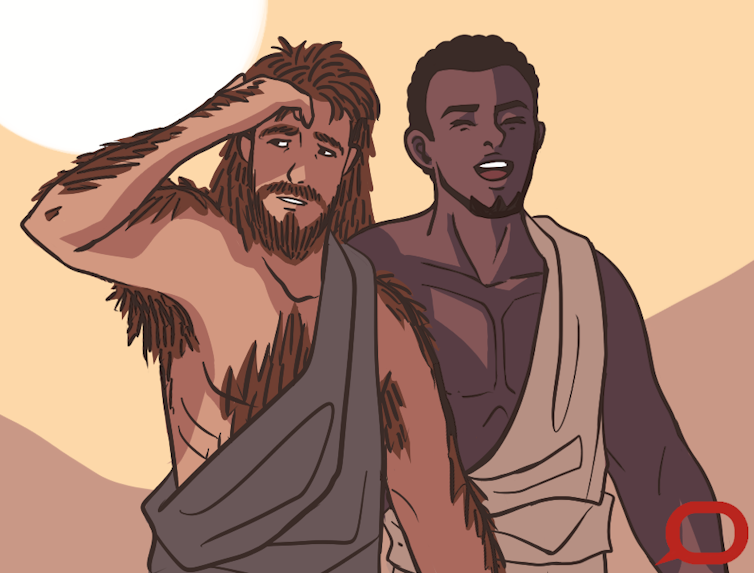Curious Kids: Why do humans not have fur like chimpanzees and gorillas?
- Written by Mark Elgar, Professor of Evolutionary Biology, University of Melbourne
This is an article from Curious Kids, a series for children. The Conversation is asking kids to send in questions they’d like an expert to answer. All questions are welcome – serious, weird or wacky!
Why do humans not have fur like chimpanzees and gorillas? – Thomas, age 4, Darlington, NSW.
We know that at one point humans did have fur! But we don’t know why we lost it, so we have to guess.
Scientists think that our ancestors (so think of your grandmother’s grandmother’s grandmother’s grandmother but over a million years ago) experienced a very big change in the climate. The world became much hotter, and that meant that people had to start travelling further and further to find food.
Dr Nina Jablonski, an expert on ancient humans, thinks that slightly less hairy people may have been in better shape to travel these distances because they would have been able to keep cool more easily.
So if you’re less hairy, it means you can travel a long way, which means you can eat more food. If you’re more hairy, it means you can only travel a short way before you get too hot, which means you find less food and go hungry.
That means the people with less hair were the ones who stayed alive long enough to have kids. And just like how you might have the same eye or hair colour as one of your parents, those kids also inherited having less hair from their parents. That’s why nowadays you won’t see very furry humans.
 We think that slightly less hairy people may have been in better shape to travel these distances because they would have been able to keep cool more easily.
Marcella Cheng/The Conversation, CC BY-ND
We think that slightly less hairy people may have been in better shape to travel these distances because they would have been able to keep cool more easily.
Marcella Cheng/The Conversation, CC BY-ND
All mammals (warm-blooded animals) have body hair, which protects their skin from sunlight and means it won’t get cut or grazed as much, but every animal has different kinds of hair for different reasons, such as:
- The colour of hair can be very useful for animals like kangaroos and dingos because it can make the animal difficult to see. That makes it easier to hide from predators, and also easier for predators to stalk prey.
 A lion’s fur blends in to its environment.
from www.shutterstock.com
A lion’s fur blends in to its environment.
from www.shutterstock.com
Most animals need hair for sun protection, but some animals, like naked mole rats which always live underground, have no fur because they don’t need any protection from the sun.
Whales and dolphins, mammals that live in the sea, have almost no hair because it is very difficult to swim if you are covered in fur.
Hair can help keep you very warm, which is helpful in a cold place. Sea otters have some of the warmest fur in the world because they live in freezing cold water next to the Arctic.
If you are a very small animal like a mouse you can get cold easily, so hair is very important. But if you are a big animal like an elephant you might not need the warmth of hair as much.
Staying warm is easier for bigger animals, which may explain why smaller primates like monkeys tend to have thicker hair than bigger ones like chimpanzees, gorillas and orangutans. (But that doesn’t explain why human hair is so fine and short… so there are still lots of questions that even scientists can’t always answer.)
Read more: Curious Kids: How do x-rays see inside you?
When we lost our hair it meant that nothing was protecting our skin against the sun. We think that we lost our hair at the same time as when people started getting darker skin (because darker skin protects you from the sun better than paler skin).
One person who studies genes (the instructions that your body gets from your parents) is geneticist Alan Rogers. He estimated that the gene (or instruction) that makes dark skin is just over 1 million years old. So we think this is when our ancestors were also losing their fur.
 We think that we lost our hair at the same time as when people started getting darker skin (because darker skin protects you from the sun better than paler skin).
Marcella Cheng/The Conversation, CC BY-ND
We think that we lost our hair at the same time as when people started getting darker skin (because darker skin protects you from the sun better than paler skin).
Marcella Cheng/The Conversation, CC BY-ND
I hope you aren’t disappointed that we can’t give you a simple answer. On the other hand, we still have an interesting mystery to solve.
Hello, curious kids! Have you got a question you’d like an expert to answer? Ask an adult to send your question to us. They can:
* Email your question to curiouskids@theconversation.edu.au * Tell us on Twitter by tagging @ConversationEDU with the hashtag #curiouskids, or * Tell us on Facebook
 CC BY-ND
Please tell us your name, age, and which city you live in. You can send an audio recording of your question too, if you want. Send as many questions as you like! We won’t be able to answer every question but we will do our best.
CC BY-ND
Please tell us your name, age, and which city you live in. You can send an audio recording of your question too, if you want. Send as many questions as you like! We won’t be able to answer every question but we will do our best.
Authors: Mark Elgar, Professor of Evolutionary Biology, University of Melbourne




